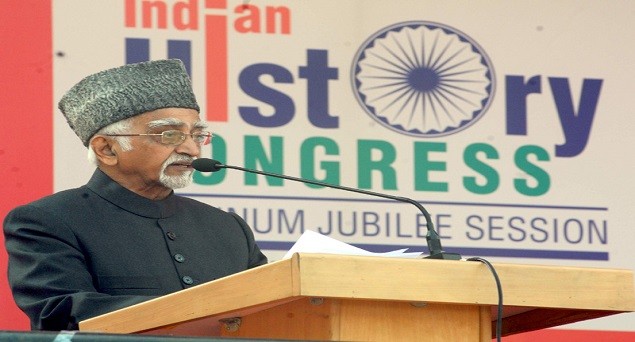By IndiaTomorrow.net,
New Delhi, 28 Dec 2014: “In our own country the sheer diversity of identities, 4635 communities according to the Anthropological Survey of India, is a terse reminder about the care that needs to be taken while putting together the profile of a national identity. It has of necessity to be liberal and accommodative; marked, to quote an eminent scholar, neither by complete homogenisation nor by the particularism of closed communities,” said Vice President of India Mohammad Hamid Ansari here today. He was inaugurating the 75th session of the Indian History Congress on ‘History and Historians’ organized by Jawaharlal Nehru University.
“Instead, it is a balance struck by ‘the mutual gravitational pull of disparate sections that make the whole.’ Our sagacity in building pluralist structures that have stood the test for over six decades, stands in contrast to many straight-jacket edifices in other societies that came to grief. By the same token, these structures need constant nurturing.”
“It is no longer a matter of debate that history has to be more than narrowly political or economic. The imperative is to make it comprehensive and inclusive of neglected groups in society. These subaltern classes, as Gramci had pointed out, are not unified and their history therefore has to be intertwined with that of civil society,” said the Vice President.
Talking about connection between politics and history, he said: “My own academic discipline in the distant past was political science and I do recall Professor John Seeley’s jingle, well known in my time and presumably not forgotten today, that ‘History without Political Science has no fruit and Political Science without History has no roots.’” “In more recent times, and for professional reasons, I came to value Winston Churchill’s aphorism: ‘Study history, study history; in history lies all the secrets of statecraft,’ he added.
Historians at all times have endeavoured, as Herodotus put it, ‘to preserve from decay the remembrance of what men have done.’ Historians have dwelt on the facts of the past and sought to make implicit or explicit judgements about those facts. Not to be ignored is a mid-nineteenth century caution that historians ‘have been seduced from truth not by their imagination but by their reason’ pursuant to the impulse of ‘distorting facts to suit general principles.’

Vice President Mohd. Hamid Ansari releasing a book at Indian History Congress, in New Delhi on 28 Dec 2014 (PIB).
“Equally hazardous is the propensity to read the past into the present or the present into the past; so is the temptation to ignore the distinction between memory and history. Memory is based on identification with the past and is unavoidably egocentric while history is based on its treatment as an external object and not a part of the self,” said Ansari.
Without referring to the clamour over alleged moves of the BJP government of Prime Minister Narendra Modi to make changes in the books of history, the Vice President said: “History also cannot be faith-based. The domains of the two exist separately and conflation does not further the cause of either.”





